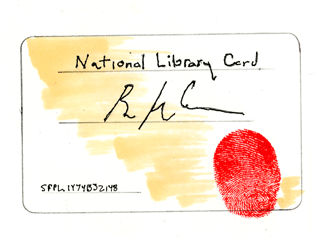Books and Information Go Their Separate Ways
- by Bruce E. McKinney

Issued locally, used nationally.
These days the relationship between the printed and electronic word is relentlessly shifting toward the net and moving beyond the control of libraries; their access increasingly the same as everyone else's and for libraries a very fundamental change toward equality with their patrons. Their model has been based on unique advantage and their uniqueness is declining as the power of the internet increases.
And so these days the future of libraries is debated. Google, as they scan older books to page by page add them to their searches, builds the world's greatest stacks, the almost unlimited library shelves that increasingly convert pages from paper to internet readable code and thereupon become searchable to a world that is quickly learning it needs one access, not many copies and certainly not many copies in many locations. This is the rub.
Libraries are of course more than the sum of their books. They are internet access to otherwise restricted sites as well as general internet access to those who can not otherwise afford it. They are reading rooms and microfiche departments, periodicals and history, eBooks and eAudio. They are also meeting rooms, exhibitions and always changing. Perhaps most importantly they are the frequently experienced staff that answers questions and directs the questioner to the right place and source. In short they are invaluable if less essential than they used to be.
What's to be done?
The leadership in the library community needs to not simply accept that the world changes but also to move from the "no choice but to" end of the bus to a front seat. In accepting a leadership role it becomes apparent that libraries do have options. There should almost certainly be a national library card and a fingerprint sign-in. It would be available to all children free of charge, available to teenagers for a nominal charge, to young adults at a reduced fee and then to all aged 26 to 60 at full price less accommodations for students, the military and those needing financial assistance. Those older would receive a reduced senior rate.
With a national system in place every library could contribute its unique material to it in electronic form and receive a portion of the income based on the number of accounts issued and the number of pages visited. The national government should contribute a portion as could state and local governments.
Once established, the statistics of use will create a path to further development.
I don't even think it would be difficult and I also believe that substantial corporations and individuals will come forward to support it both with ideas and money. For today though it isn't money that's needed, it's vision and confidence.
The future is out there. It's time to go get it.